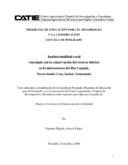Institucionalidad rural vinculada con la conservación del recurso hídrico en la microcuenca del Río Caquijá, Sierra Santa Cruz, Izabal, Guatemala

View/
Date
2006Author
Arrecis López, E.M.
Autor Corporativo
CATIE - Centro Agronómico Tropical de Investigación y Enseñanza
Type
Tesis de maestría
Metadata
Show full item recordAlternative title
Rural institutions dealing with the conservation of water resources in the microwatershed of the Caquijá River, Sierra Santa Cruz, Izabal, Guatemala
Description
Tesis (Mag. Sc.) -- CATIE, 2006
Abstract
El presente estudio se fundamenta en la necesidad de conocer las características e interacciones del capital social del área y proponer alternativas que fortalezcan la organización comunitaria que conlleven al manejo integral y sostenible de los recursos naturales y por lo tanto, a la conservación de la ZRH. El trabajo se desarrolló mediante una investigación exploratoria cualitativa con metodologías de investigación-acción participativa con la colaboración de FUNDAECO, institución que ejecuta en el área actividades previas al co-manejo". A través de talleres, grupos focales y entrevistas, el análisis de actores reflejó que las cuatro comunidades que se abastecen de agua potable, actualmente no realizan de forma coordinada actividades que beneficien a la ZRH y desconocen las condiciones del capital natural en la misma. Así como tampoco están al tanto de los detalles de la forma de trabajar, las necesidades y limitantes de los comités responsables del agua potable. Sin embargo, a pesar de las limitantes arriba identificadas, la sistematización de las experiencias del trabajo de los comités determinó que la acción colectiva que años atrás realizaron los comités responsables del agua potable, fueron determinantes para evitar la pérdida del bosque, realizar actividades de vigilancia y de mantenimiento de la infraestructura del agua potable. This study was prompted by the need to understand the characteristics and interactions of the social capital of the study area so as to propose options that strengthen community organization, and thereby lead to integrated sustainable management of the natural resources and therefore to conservation of the headwaters. A qualitative, exploratory study was carried out using participatory research/intervention, with the collaboration of FUNDAECO, an institution that carries out activities in the area aimed at laying the foundation for co-management. The evaluation of the working experiences of the committees showed that in spite of the limitations mentioned above, the collective action that they had engaged in years before was a factor that determined the preservation of the forest, the patrolling of the area and the maintenance of the potable water infrastructure.
Keywords
Delegation
Sede Central
Asesor
Prins, C.
Publisher
CATIE, Turrialba (Costa Rica)
Is part of
Maestría en Socioeconomía Ambiental
URI (Permanet link to cite or share this item)
https://repositorio.catie.ac.cr/handle/11554/3924Collections
- Tesis [3115]

